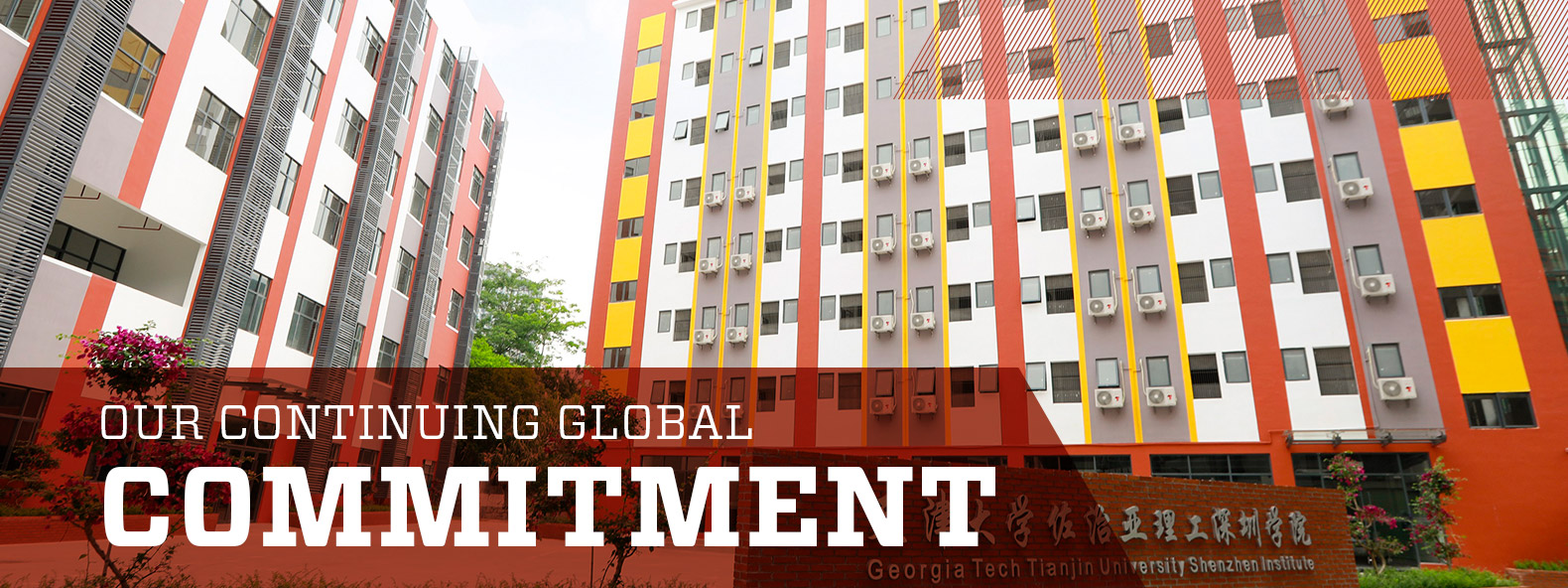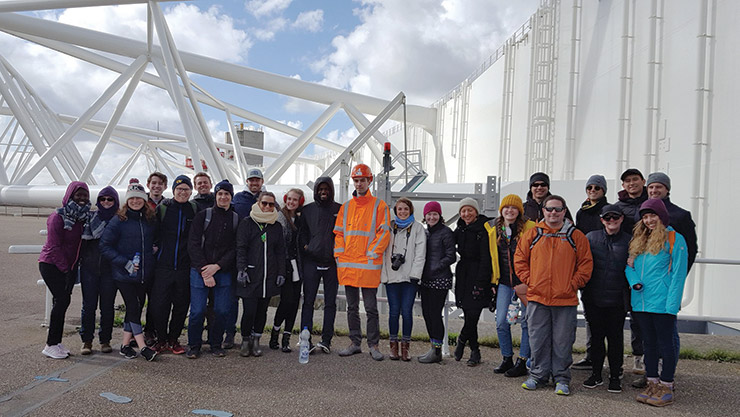
Annual Report 2019: Our Continuing Global Commitment
While enhancing our local and regional economies is a strategic priority of Georgia Tech’s, so too is the priority of positioning ourselves on the international stage. As an institution of higher learning, we remain fiercely committed to ensuring that we are graduating engaged global citizens.
Transitional Campus Opens in China
Transitional Campus Opens in China
April saw the opening of Georgia Tech Tianjin University Shenzhen Institute (GTSI), a partnership between Georgia Tech and Tianjin University in the city of Shenzhen, often referred to as China’s Silicon Valley. Some 100 people — representing Georgia Tech, Tianjin University, and students, alumni, and friends of both universities — attended the opening ceremony.
Three buildings with a total area of 208,260 square feet on 19 floors, including a dormitory building, form the transitional campus. The main building has state-of-the-art classrooms, faculty and staff offices, a library and reading rooms, an auditorium, cafeteria space, conference rooms, and faculty apartments.
The transitional campus is being provided to GTSI on a complimentary basis by the Shenzhen government until a future permanent campus can be built on nearby government-allocated land so the two universities can offer collaborative education programs in Shenzhen.
Although the city — which a mere 40 years ago was no more than a collection of fishing villages — is considered the high-tech capital of China, it lacks higher education capacity for its population of 12 million.
Georgia Tech-Shenzhen has been offering the M.S. in Electrical and Computer Engineering since Fall 2014. The intention with this new facility is to offer five additional degrees that have already been approved by the University System of Georgia: a Master of Science in Environmental Engineering, a Master of Science in Computer Science, a Master of Science in Analytics, a Master of Industrial Design, and a Ph.D. in Electrical and Computer Engineering.
These additional programs are awaiting approval from the Chinese Ministry of Education, which requires educational programs to satisfy certain space and educational resource requirements before being offered.
In conjunction with the campus opening was the inaugural Sino-U.S. Symposium on Emerging Engineering Education, which brought together academic, government, and business leaders to examine the global challenges of 21st century engineering education and to enhance the dialogue between academic institutions and industry.
Tech Places 34th Among Hundreds Cited in Global University Rankings
Georgia Tech placed 34th among 1,258 institutions in a new ranking of world universities. Evaluation criteria included teaching, research, and the impact of publication citations. The 2019 Times Higher Education World University Rankings also ranked Tech 21st among 172 U.S. institutions.
According to the rankings, research was Tech’s strongest area, where it placed above 90% of others evaluated. Tech also ranked well in teaching, citation impact, industry income, and international outlook.
Overall, the rankings considered 13 metrics ranging from teaching and research reputation to industry income and percentage of international students.
Spring Breakers Serve Their Country and the World

Students visit Delta Works in the Netherlands on a trip with the School of Civil and Environmental Engineering.
Spring Breakers Serve Their Country and the World
In keeping with Tech’s strategy of expanding Yellow Jackets’ international footprint and influence, students and faculty scattered across the country — as well as the globe — to serve, research, and educate during Spring Break 2019.
Biloxi, Mississippi
Alternative Service Break volunteers worked with Community Collaborations, as well as local Head Start and Boys and Girls Clubs, on early education initiatives.
China and Japan
The International Disaster Reconnaissance Studies class from the School of Civil and Environmental Engineering explored Chengdu, China, including a flood-control system created thousands of years ago and a city devastated by an earthquake that was preserved in tribute to those who died. They also traveled to Japan to learn more about tsunamis and human-made disasters such as the atomic bomb the U.S. dropped over Hiroshima.
Cozumel, Mexico
The Campus Recreation Center organized a scuba trip in partnership with Professional Education and Student Life. The trip’s mission was to inspire environmental and multi-cultural awareness.
Denver, Colorado
Alternative Service Break volunteers served with GRID Alternatives to implement solar power projects.
Jacksonville, Florida
For the 10th year, students worked with Beaches Habitat for Humanity as part of a collegiate challenge.
Hungary, Israel, South Africa, and China
Scheller College of Business MBA students fanned out across the globe to complete client projects as part of their international practicums. Students in the Denning Technology and Management Program visited Shenzhen University to participate in an annual undergraduate forum.
La Paz, Bolivia
The Environmental Technology in the Developing World class spent the week collecting water samples and conducting research on water quality.
Maryville, Tennessee
Volunteers worked with Once Upon a Time, a wilderness retreat located in the Cherokee National Forest, providing trail maintenance, creek cleanup, and habitat restoration.
Medina Bank, Belize
Students visited a rural Mayan village to expand a local community health center, working with the local organization 7Elements.
Monte Cristi, Dominican Republic
Volunteers helped prepare English lessons for local children, in partnership with the group Outreach360.
South Carolina
The Trailblazers student group explored Devils Fork State Park and Hunting Island State Park, doing environmental volunteering, hiking, and camping.
The Netherlands
Kari E. Watkins, the Frederick Law Olmstead Associate Professor in the School of Civil and Environmental Engineering, and her students biked through the Netherlands. The students were from her Sustainable Transportation Abroad class. They traveled about 15 miles daily, exploring what it means to be a bike-first culture where cycling receives preference as a mode of transportation.
Georgia Tech and Georgia State Establish Atlanta Global Studies Center

Georgia Tech and Georgia State Establish Atlanta Global Studies Center
Georgia Tech and Georgia State University have established the Atlanta Global Studies Center (AGSC), a national resource center and a Foreign Language and Area Studies (FLAS) Fellowship program.
The interdisciplinary center, funded by a $2.25 million grant from the U.S. Department of Education, will focus on research and instruction geared to student populations that are underrepresented in international and advanced language studies.
It will engage college students throughout Atlanta — including STEM students; community college students; and minority, first-generation, and low-income students — with a goal of educating them for careers in business, education, security and defense, and public and governmental sectors.
AGSC will foster specialized instruction in international education and less commonly taught languages such as Arabic, Korean, Portuguese, and Hindi. In addition, the AGSC will manage FLAS fellowships for undergraduate and graduate students. Prospective fellows must enroll in language programs and will receive a full-tuition waiver and stipend.
Anna Westerstahl Stenport, chair of Tech’s School of Modern Languages, spearheaded the grant proposal. She said that AGSC priorities will encompass curriculum enhancement, faculty professional development, public events, conferences, language instruction, and K-12 and community outreach.
“Our mission is to enhance access to advanced language learning and deepen knowledge of global and intercultural issues for the benefit of Atlanta-region students, faculty, and the public,” said Stenport, AGSC codirector. “This will be facilitated through robust collaborations in research and instruction with Atlanta universities and with international organizations, consulates, refugee organizations, and institutions of public service and higher education in the Southeast and nationally.”
(text and background only visible when logged in)
